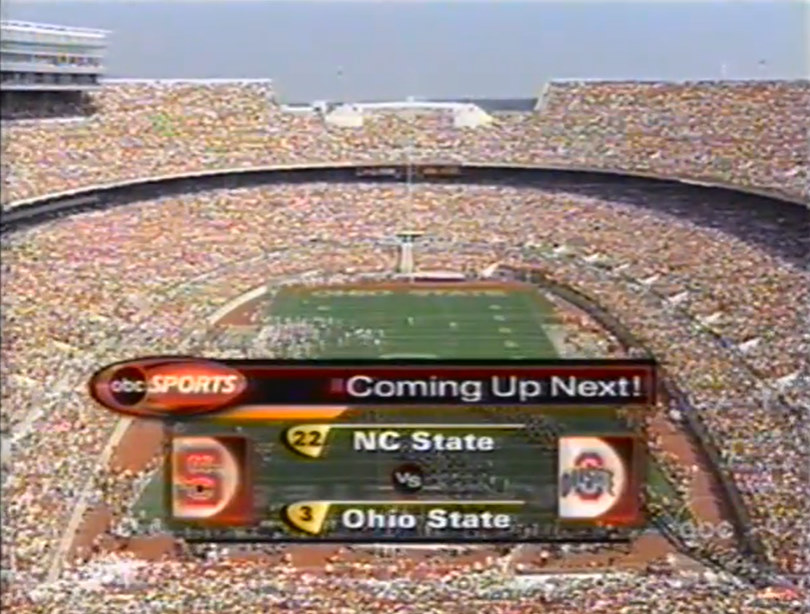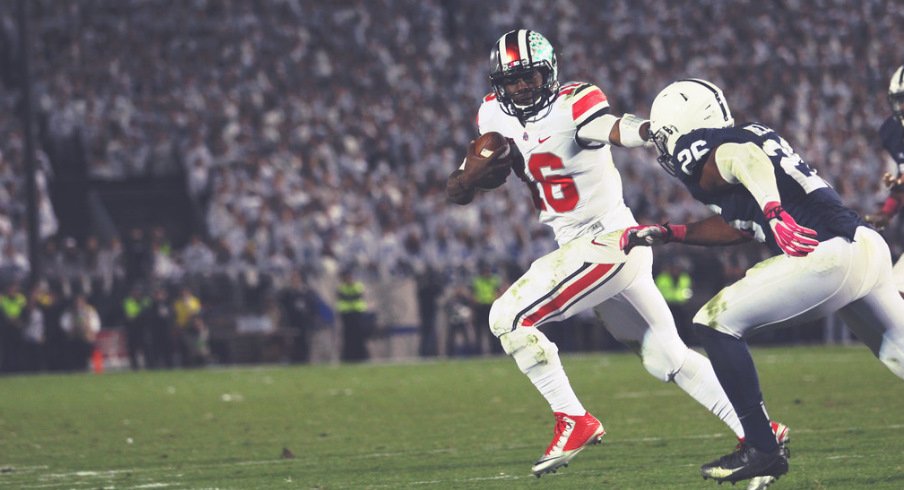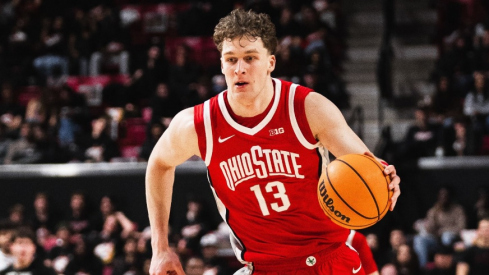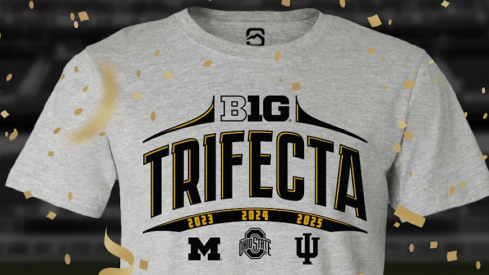I was in the stands, chortling with glee, as Ohio State and the North Carolina State Wolfpack went into overtime in 2003.
Not necessarily because I was happy about the fact that it had to happen. Philip Rivers and the Wolfpack were all but dead and gone with nine minutes left in the 4th quarter in Columbus, trailing 24-7. But then Rivers, reminded of all the money he'd go on to make in the NFL, decided to Play Good and led NC State to 17 unanswered points and forced the Buckeyes to play in the first ever overtime game in Ohio Stadium's history.

I removed my glasses, rubbed my eyes in disbelief like Don Knotts in The Incredible Mr. Limpet, and settled in for something extremely weird that I hadn't seen before.
I'll distract myself from the reality that Philip Rivers is now retired from the NFL, meaning that the decrepit, shambling corpse writing this missive is roughly his age, by pointing out that our demand that college football end in a not-tie is a relatively recent adventure. The first FBS college football game to use overtime was the 1995 Las Vegas Bowl, where the Toledo Rockets, led by head coach Gary Pinkel, beat the Nevada Wolfpack (wait, NC State and Nevada have the same mascot??) in a single, glorious overtime period by the score of 40-37. Pinkel would say this about it years later:
Back in the 1995 Las Vegas Bowl, when the overtime rules were put into effect for the bowl season before beginning throughout I-A in 1996, everything was new to the players and fans alike.
"I vividly remember that when we decided to go on defense first our fans didn't understand it either. All our fans were booing," Pinkel says with a laugh.
Those fans were dumb or at least short-sighted because they didn't understand what they were witnessing an evolution that would make college football alone stand out as one of the most purposefully weird endeavors in the human drama we call sports.
If you need a refresher, college football's overtime rules are (as shortened from the obnoxiously long explainer on the NCAA's official website):
- Overtime periods consist of a two-possession series with each team getting one possession on offense and one on defense. The team on offense will always start at the designated 25-yard line (unless relocated by a penalty).
- Each team retains the ball until it scores or fails to make a first down.
- The team that scores the most points during regulation and overtime wins the game. If the game is still tied after an overtime period, there will be another overtime period.
- In 2021, the NCAA Playing Rules Oversight Panel approved a change to overtime rules. Teams will be required to run a 2-point conversion play after a touchdown when a game reaches a second overtime period.
- Also established in 2021, if the game reaches a third overtime, teams will run alternating 2-point plays, instead of starting another drive at the opponent’s 25-yard line.
- Everybody gets a push pop if Sammy's mom remembered to buy them.
I added the last one.
And okay, sure, the NFL has had overtime for generations. But who cares: even with the (cowardly, correct) new change to guarantee both teams a possession in the playoffs, the NFL's attempt at competitive parity simply puts it in line with the rest of the sporting universe's sensical, boring overtime rules.
I've wondered what exactly are the properties of football that specifically makes it so ripe for strange and/or ridiculous attempts to end a tied game. If you look at the vast ecosystem of structured competition on this planet, you'll find that most organized sports handle a tied game by simply playing more for a designated period of time. While the Elam Ending is a fun exception to this rule, in general most sports just add a few minutes to the clock and shrug.
But for some reason in football we've made the collective decision that that's not an adequate measure of competency or success. As in baseball, we've decided that both teams should get an opportunity to accomplish something they failed to do over the course of three-and-a-half butt-numbing hours: establish decisively that they're better on offense than the other team.
This is a delightfully weird concession to some deep-seated desire in our lizard brains to give us something to complain about, and has an obvious "flaw" in that if both teams happen to be absolutely ass on offense, this happens:
I personally don't like calling the above "nine overtimes", since after the second period it's basically Bart and Lisa kicking and punching the air in front of them with their eyes closed, but officially that 20-18 "victory" is the longest overtime game in NCAA history. My heart knows that the record actually belongs to Texas A&M's 74-72 seven overtime victory over LSU in 2018, one of five overtime games in NCAA history that went into seven periods.
Either way though: pretty funny and great, and I think I finally figured out why I was so excited back in the ancient time of September 2003.
College football overtime is a black hole that condenses everything about a team into a tiny little ball of anxiety. As teams dance back and forth on offense and defense, all the bad and good qualities that you learn about a team over the course of a full game are on display in vivid detail, with the added benefit that a single mistake on either side can end the game immediately. It is a nervy, silly escapade that pays off emotionally in a way that everyone standing around as a clock runs out can't replicate.
Plus, selfishly: Ohio State has done pretty well by itself in overtime games! Whether it's winning a national championship or smooth jazz taking over Ohio Stadium or a walk off sack against Penn State or a goal line stand to beat NC State in 2004 as a teenaged college freshman named Johnny Ginter squeakily yelled his approval from the stands, I generally feel confident when the Buckeyes end up going into extras.
Is college football overtime weird, inefficient, and a poor representation of the respective abilities of both teams? Yes, yes, and yes. But it is also damn fun to watch.


